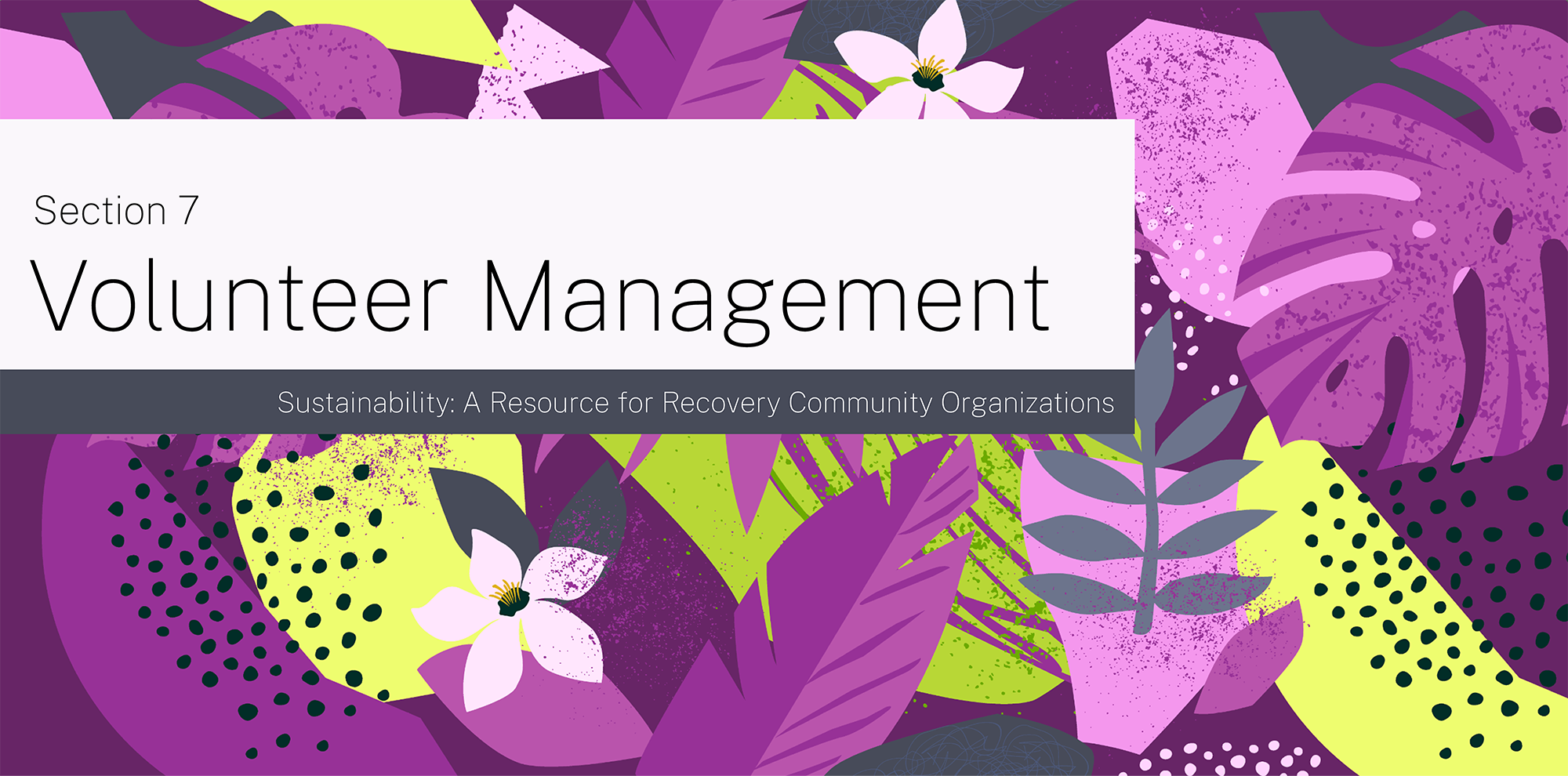
Section 7: Volunteer Management
This section focuses on steps and benefits of creating a Volunteer Program
Creating a robust volunteer program in a RCO is a powerful way to harness the energy and enthusiasm of individuals who want to give back to their community. Often, those who initially approach a RCO seeking support and resources eventually become volunteers themselves. This not only grows the individual's recovery capital, but also significantly boosts the capacity of the RCO. By successfully involving volunteers, a RCO can improve its ability to deliver essential services and create a thriving, supportive volunteer community.
As a RCO leader, ask yourself these questions as you move through this Section:
- How can we enhance our volunteer programs to ensure volunteers feel confident and empowered in their roles?
- How can we better assess and align volunteers’ abilities to create a more meaningful experience for them?
- How are we building opportunities for personal and professional growth for our volunteers?
Volunteer programs within RCOs require a well-thought out plan and resources. This involves having someone responsible for managing the program, overseeing recruitment, onboarding, training, and retention of volunteers.
Developing Volunteer Opportunities
Begin by identifying the specific areas where volunteers can make a meaningful impact and grow their recovery capital. Ask yourself: Are there opportunities for volunteers to develop their computer skills, public speaking abilities, event planning expertise, or capacity to facilitate educational workshops?
RCOs can use a participatory leadership model like the NOAH system, created by Dr. Ivan Scheier, to empower staff and volunteers in developing volunteer opportunities.
Below are the simplified steps from the NOAH system:
- Everyone in the organization, including the executive director, lists their tasks and responsibilities.
- Each member notes what they would like to do if they had more time and resources.
- They examine their lists to identify tasks that volunteers could assist with or take over.
- Develop volunteer roles that are accessible, inclusive, and considerate of various backgrounds and abilities.
- Define roles with clear expectations, responsibilities, and opportunities for growth and leadership.
- After discussion, the team decides which opportunities will be included in the RCO’s volunteer program.
Creating Volunteer Position Descriptions
Develop clear and comprehensive descriptions for each volunteer role to ensure that potential volunteers understand their responsibilities and expectations. Include information about time commitments, necessary skills or qualifications, and any training or orientation requirements.
A volunteer position description, much like the description of a paid job, should include the following:
- Job title
- Job location
- Description of duties
- Impact of the role
- Qualifications
- Time commitment
- Training opportunities
Resource: Volgistics offers an in depth Guide to Writing a Volunteer Job Description.
See Recovery Communities of North Carolina’s online Volunteer for Recovery volunteer position descriptions and process.

Volunteer Recruitment
Evaluate your current recruitment strategies to ensure they reach diverse audiences. Consider utilizing a variety of platforms and outreach methods to attract a wide range of volunteers. Reach out to your community through multiple channels, such as social media, public education events, training, and get referrals from current volunteers and staff. Consider partnering with faith-based groups and other community organizations to expand your reach. Additionally, maintain a database (this could be a spreadsheet or a low-cost volunteer management software system) of interested individuals and regularly update them on volunteer opportunities.

Volunteer Selection and Screening
For certain volunteer opportunities at a RCO, a screening process, including reference or background checks, may be necessary. In some cases, legal regulations or funding sources can mandate background checks for the volunteer programs it funds. For RCOs that work with vulnerable populations, it is recommended that you review funder contracts and check with legal counsel to see if background checks are mandatory. Remember, the screening process's purpose is not to disqualify individuals, but to find a role that is the right fit. RCOs should offer volunteer roles suitable for a wide variety of people with diverse lived experiences, so everyone has the opportunity to engage with the RCO and grow their recovery capital.

Orientation and Training
Offer orientation and training programs to equip volunteers with the necessary skills and knowledge to carry out their roles effectively. Some RCOs hold orientation programs to give new volunteers a sense of what the RCO is all about- its history, work environment, who they will be working alongside, what is expected of them, and the benefits they can expect to receive.
The topics commonly covered during the orientation include:
- An overview of the RCO and its programs
- An introduction to the RCO’s staff, Board of Directors, Peer Advisory Council along with an explanation of their roles
- Current volunteer roles and expectations
- An overview of the RCO, its mission, vision, and values
- An overview of the RCO’s policies and procedures
- A tour of the RCO, showing volunteers where essential areas like offices, restrooms, and parking are located.
- Emergency procedures, including instructions for severe weather events, the location of the first aid kit, and other essential safety information.
Training will be specific to the volunteer role—what the volunteer will be doing and how to do it. Training may also include topics such as education on recovery-oriented principles and practices, communication skills, cultural sensitivity, and confidentiality. Many RCO’s training programs involve having a new volunteer shadow a staff member or seasoned volunteer to learn the ins and outs of the role. It gives the new volunteer an opportunity to see and experience how the work is done, ask clarifying questions, and get feedback on their performance.

Volunteer Handbook
Develop a volunteer handbook or manual that outlines your organization's policies and procedures, including expectations, code of conduct, confidentiality protocols, and grievance procedures. This will help ensure consistency and provide guidance for volunteers and staff members.
Resource: See this Recovery Volunteer Handbook example from the Scottish Recovery Consortium website.

Support and Supervision
Encourage regular communication and collaboration among volunteers. Organize regular meetings, workshops, or social events to build a sense of community and maintain volunteer motivation and engagement. Recognize and appreciate contributions of volunteers through formal or informal means, such as volunteer appreciation events or certificates of recognition.
Be sure to assign a designated staff member or volunteer coordinator to serve as the main point of contact for volunteers. This individual can provide guidance and support, answer questions, address concerns, and facilitate ongoing training and development opportunities.

Evaluate and Adapt
Continuously assess the effectiveness of your volunteer management program by gathering feedback from volunteers, program participants, and staff members. Use this feedback to make improvements and adaptations as needed, ensuring that the program remains relevant and impactful. RCOs can collect metrics to include things like the total number of volunteers, hours contributed, and the increase in participants served with volunteer assistance. They can also include surveys about volunteers' experiences, stories in the RCO’s social media channels and exit interviews with volunteers. Financial measures such as return on investment and the value of volunteers' time can also be included. These metrics will be used by the RCO’s leadership to track progress and discuss with staff, update the board, and include in annual reports.
Resource: The Nonprofit Learning Lab offers a course on Effective Volunteer Management at a reasonable cost. The Association of Leaders in Volunteer Engagement offers a wide range of free resources as well.

Section 7: Pause & Reflect
At the end of each section, take time to reflect on what was presented, consider how it applies to your unique situations, structures, and goals of your RCO, and identify possible next steps.
At the end of each section, take time to reflect on what was presented, consider how it applies to your unique situations, structures, and goals of your RCO, and identify possible next steps.
- What information or ideas were new, interesting, helpful, or hopeful in this section?
- How does this section guide your organization in adapting, improving, or building upon the RCO Guiding Principles and Practices listed below? For each point, consider "What is going well?" and "What could be better?"
- Led and governed by members of the recovery community
- Grassroots, local, community-based decision-making
- Participatory practices are emphasized, promoting community involvement and collaboration.
- All pathways and recovery journeys are honored and celebrated
- Diverse, equitable, and inclusive policies, practices, and services
- Recovery oriented language that is strengths-based and person-centered
- What areas of your organization do you think might need some work or review?
- What is one small step you can take in the next 2–3 weeks to begin doing that work or review? (This could be emailing someone to schedule a meeting, finding and printing the most up to date draft of something, or asking someone to review draft language.)


